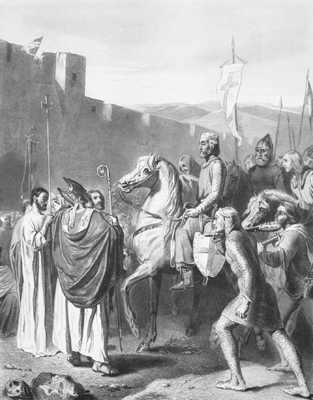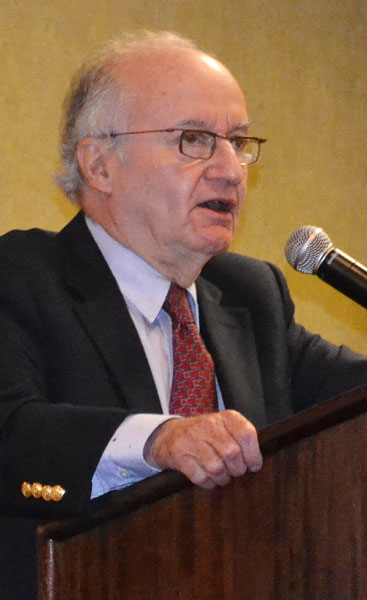
An undated illustration shows the taking of the Greek city of Edessa in 1097 during the First Crusade. Religion News Service photo, courtesy of The History Channel/Bettmann/Corbis.
(RNS) It used to be that Social Security reform was the “third rail” of American politics. Touch it and you got zapped. The same could be said for discussing religion — it’s just something you didn’t talk about in polite company.
President Obama recently stumbled into a third. The “C word.” Crusades.
In attempting to show that all religions (not just the murderous Islamic State group) have engaged in violence, Obama told the National Prayer Breakfast: “And lest we get on our high horse and think this is unique to some other place, remember that during the Crusades and the Inquisition, people committed terrible deeds in the name of Christ. In our home country, slavery and Jim Crow all too often was justified in the name of Christ.”
Obama was not the first president to use the word. Dwight Eisenhower called his successful World War II military campaign against Nazism the “Crusade in Europe.” After the 9/11 terrorist attacks, George W. Bush first labeled the battle against Islamic extremists a “crusade.” He later dropped the word and reformulated it as a “war on terror.”
Obama’s critics denounced his reference to the Crusades and claimed that European Christians, beginning in 1096 and continuing for the next 200 years, used their military might in a worthy effort initiated by Pope Urban II. The papal purpose was to stem feared Muslim aggression, to protect Christian pilgrims in the Middle East and reclaim areas of the Holy Land, especially Jerusalem, which had been captured in 637 by Islamic forces. For their valiant efforts, the pope promised his warriors remission from their sins.
After Obama’s speech, Louisiana Gov. Bobby Jindal, a wannabe GOP presidential candidate, reminded us that the Crusades happened a long time ago. Acting as a religious historian, Jindal assured a nervous nation that “the medieval Christian threat is under control.” Good to know.
But that doesn’t mean that the term “Crusades” is some sort of benign, even quaint, historical reference.
As part of that long-ago “threat,” the Roman Catholic Crusaders were equal opportunity attackers during their two centuries of bloody assaults, killing thousands of Jews, Muslims and even Orthodox Christians. In 2001, St. John Paul II wrote to Christodoulos, the Orthodox archbishop of Athens, saying: “It is tragic that the assailants, who set out to secure free access for Christians to the Holy Land, turned against their brothers in the faith. The fact that they were Latin Christians fills Catholics with deep regret.”
When the Christian Crusaders conquered Jerusalem in July 1099, they killed untold numbers of Muslims. That massacre is an integral part of the Islamic narrative about the West and the Crusaders.
Today, many anti-Western Muslim militants, including al-Qaida and the self-declared Islamic State, label all Westerners in the Middle East, including Jews, as “Crusaders” who will ultimately be expelled from the region, just as the original Crusaders were ousted after they lost the final battle in Acre (now a part of modern Israel) in 1291.
While Christians may debate the positive and negative legacies of the Crusades, the lethal events of that horrific era are, however, indelibly etched into the collective memory of the Jewish people.
Godfrey of Bouillon, a prominent Crusade leader from France, wanted “to go on this journey (to Jerusalem) only after avenging the blood of the crucified one by shedding Jewish blood and completely eradicating any trace of those bearing the name ‘Jew,’ thus assuaging his (Jesus) own burning wrath.” Spurred by such fiery rhetoric while marching to the Holy Land, the Crusaders stopped along the way and murdered thousands of Jews — including women and children — in the German towns of Mainz, Trier, Cologne and Regensburg.

Rabbi A. James Rudin, the American Jewish Committee’s senior interreligious adviser, is the author of “Cushing, Spellman, O’Connor: The Surprising Story of How Three American Cardinals Transformed Catholic-Jewish Relations.” Photo courtesy Rabbi A. James Rudin
Although some Catholics offered protection to the vulnerable Jewish communities, Rabbi Eliezer ben Nathan, an eyewitness to the slaughter of innocents, wrote of “cruel … Frenchmen and Germans … (who) put crosses on their clothing and were more plentiful than locusts on the face of the earth.”
When the Crusaders captured Jerusalem, they burned a synagogue filled with Jews. For the next 88 years, the Christian rulers did not allow Jews to live in the city.
No wonder the single word “Crusades” is filled with such extraordinary emotional and historical power, and one that should be used carefully, if ever.
(Rabbi A. James Rudin, the American Jewish Committee’s senior interreligious adviser, is the author of “Cushing, Spellman, O’Connor: The Surprising Story of How Three American Cardinals Transformed Catholic-Jewish Relations.”)
KRE/MG END RUDIN




